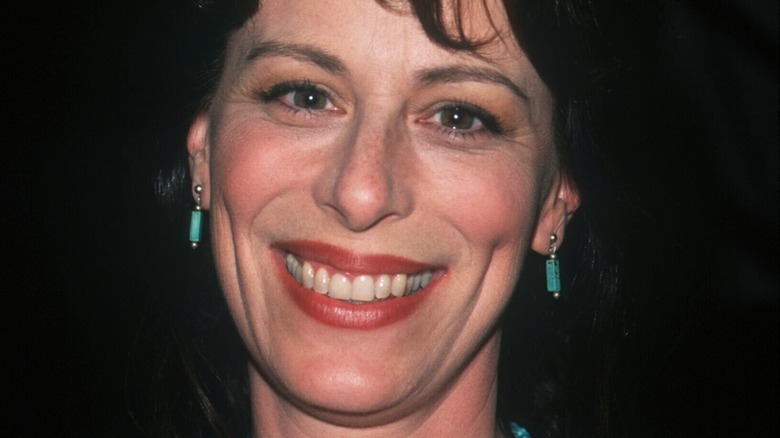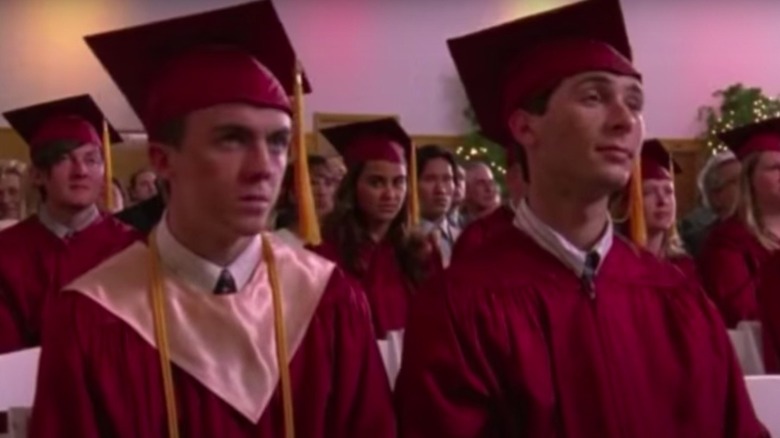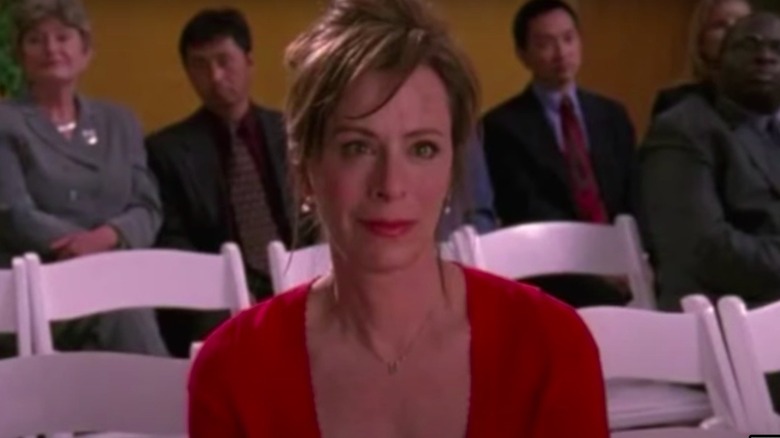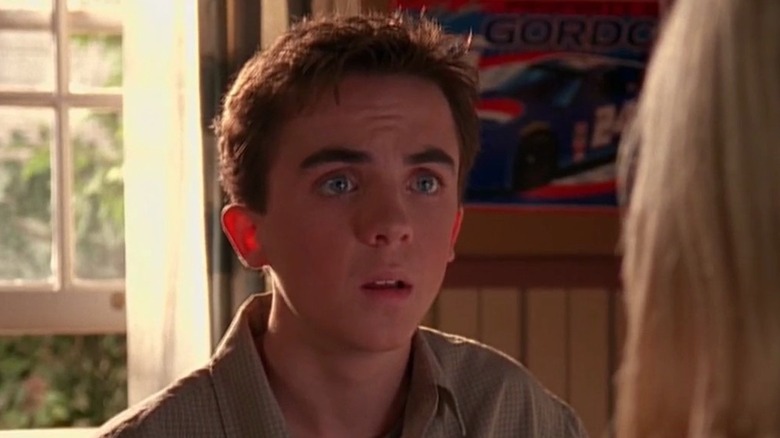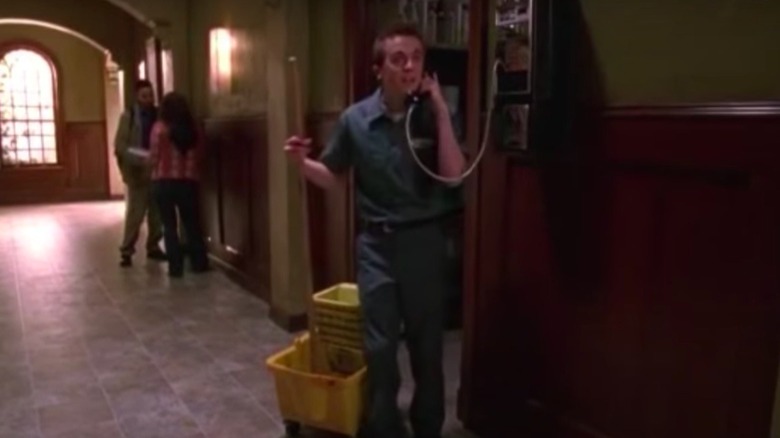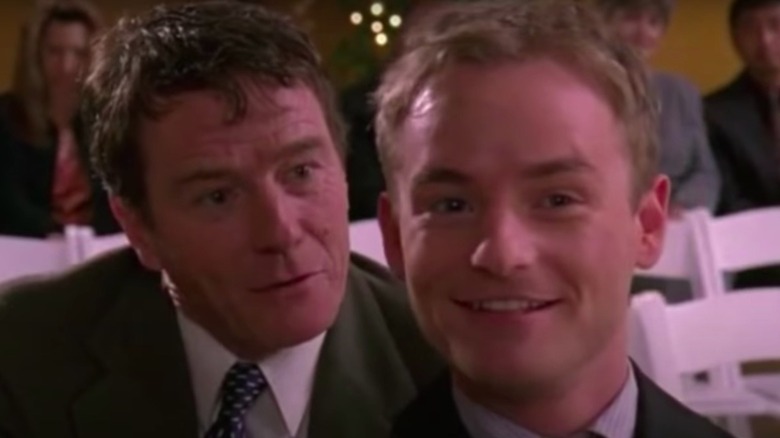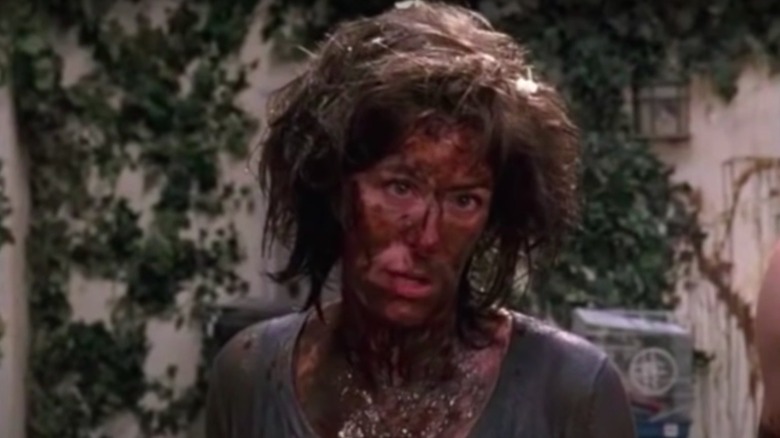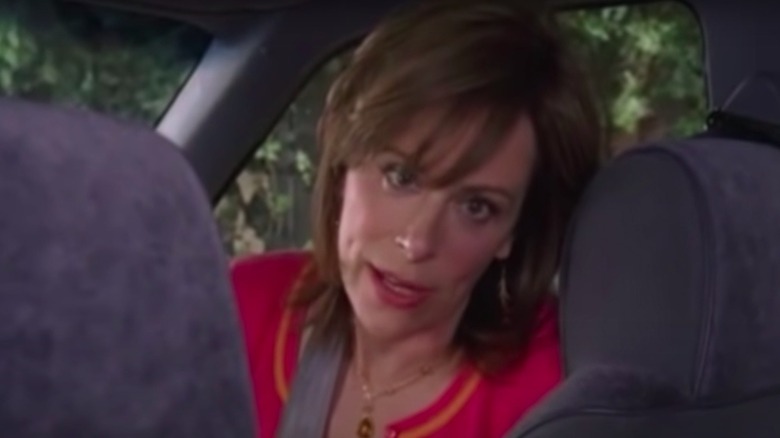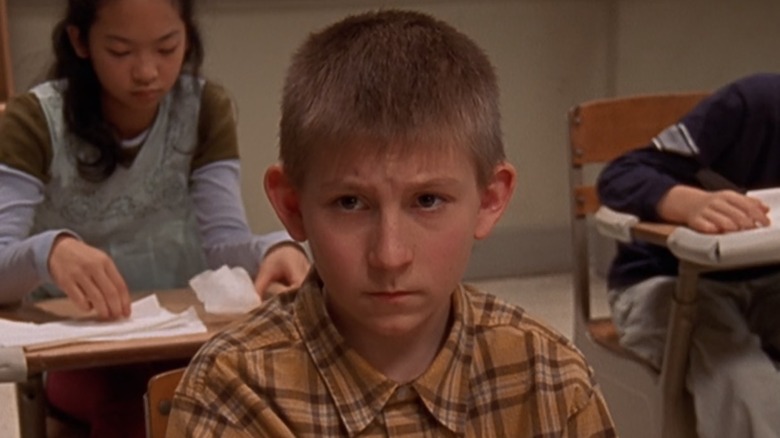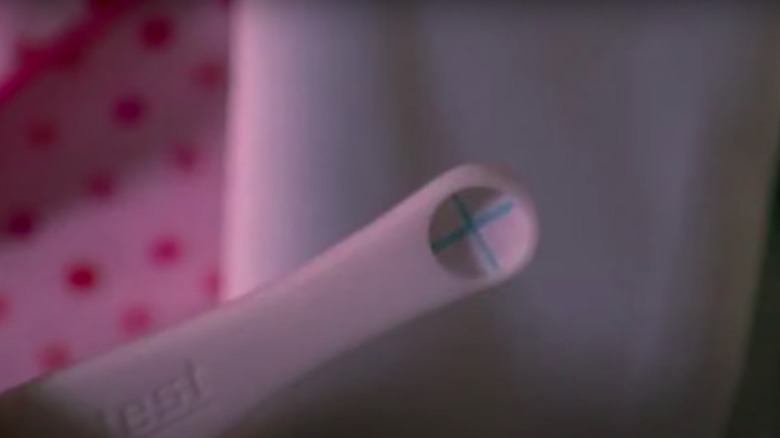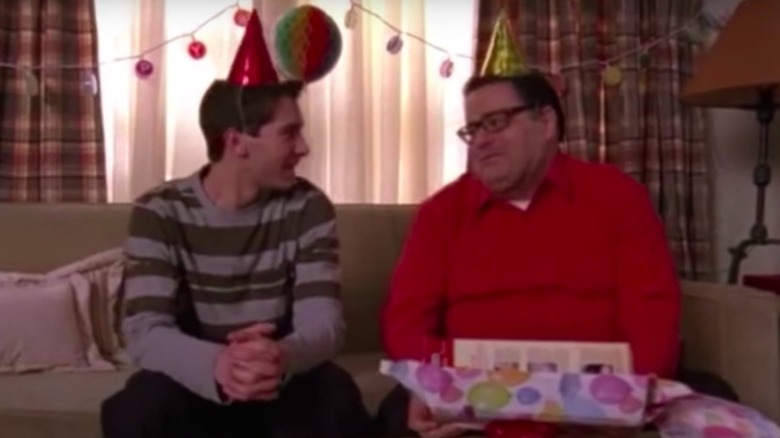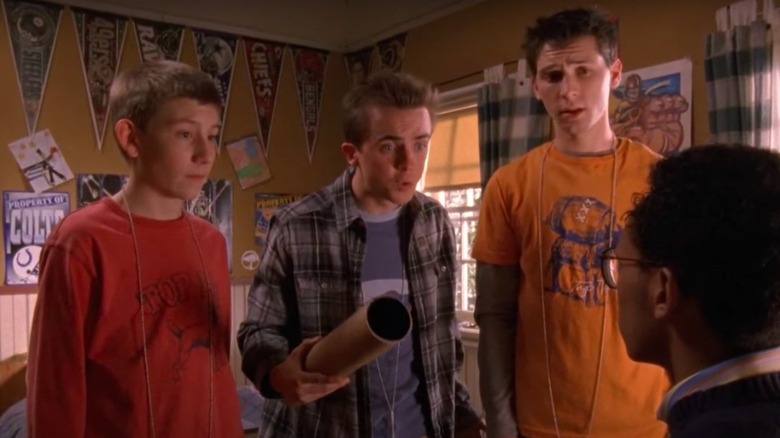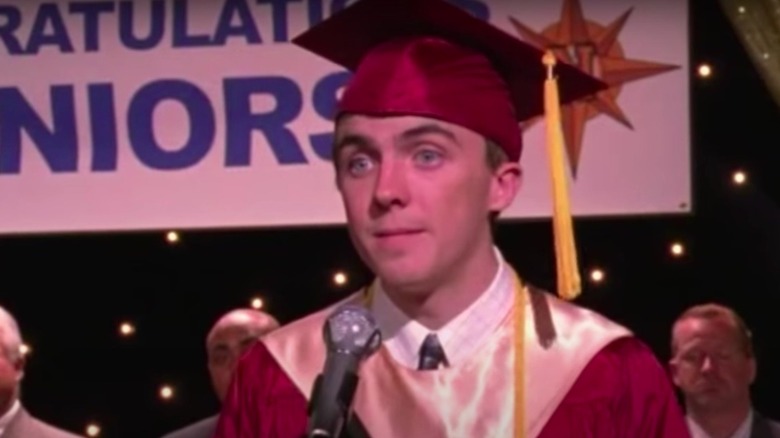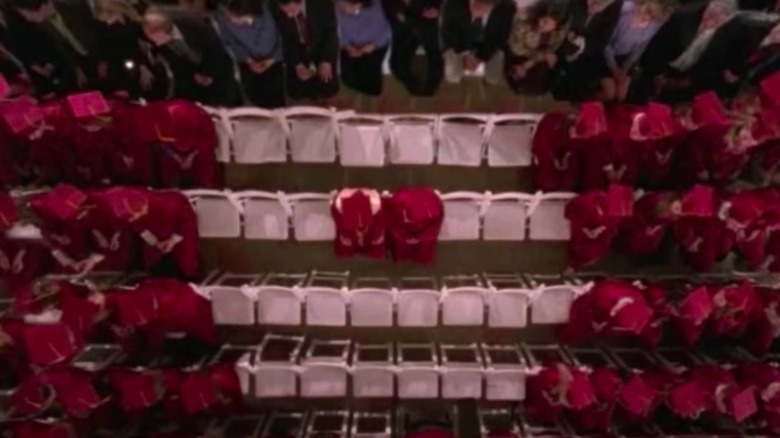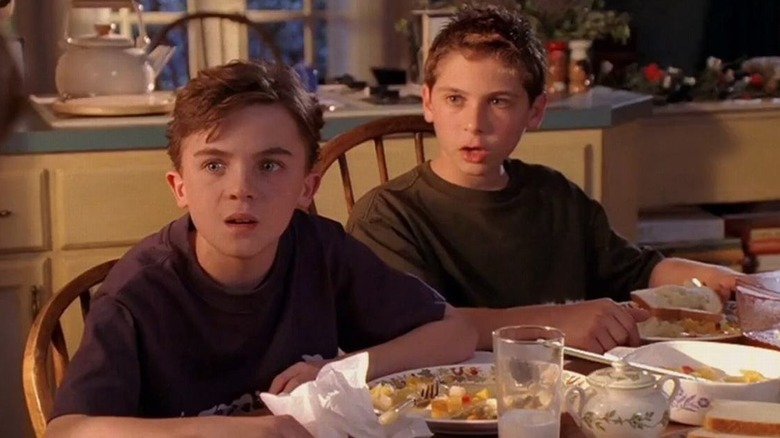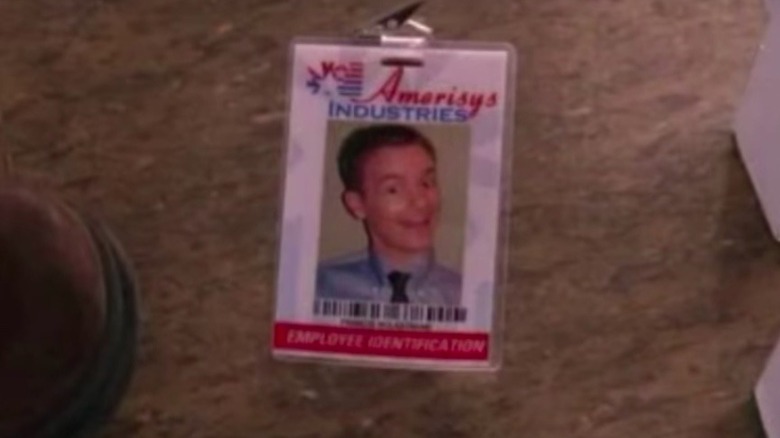The Ending Of Malcolm In The Middle Explained
Popular 2000s sitcom "Malcolm in the Middle" loves to break the rules. This didn't just make it a success — it made it one of the funniest sitcoms in TV history. Presenting a relatable look at a dysfunctional family with considerably less financial stability than many of their fictional peers, the show disrupts the tried-and-true sitcom format in a million little ways. On "Malcolm in the Middle," characters break the fourth wall, a single-camera filming style is employed, and there is no laugh track. Though modern viewers have gotten used to these choices, at the time, they were anything but expected. This approach earned the series a number of accolades and seven solid seasons, concluding in 2006's "Graduation."
As is to be expected with series finales, the last episode of "Malcolm in the Middle" is a moving goodbye to the main characters, many of whom leave youth behind to embrace the responsibilities of adulthood. It's especially distinguished by its emotional character epilogues, which look back to the beginning of the series and into the far future. This is delightful, but some may find certain elements of "Graduation" confusing, as it contains so many subtle references to earlier seasons. Not to worry — we're here to break down every element of this hilarious and heartwarming farewell. This is the ending of "Malcolm in the Middle," explained.
Reese and Malcolm are finally friends
In the final scene of the series, viewers witness Malcolm and Reese exchange a fairly personal phone call. Reese fills Malcolm in on his personal life and career, telling him about his recent promotion before asking Malcolm how he's faring at Harvard. This scene may initially seem to provide Reese and Malcolm with a simple epilogue, but it also shows just how far their relationship has come over the course of "Malcolm of the Middle."
From the very beginning of the series, Malcolm and Reese are consistent foes. Complete opposites in terms of personality, they share a vindictive streak that constantly leads them to prank, sabotage, and harm each other any way they can. However, by the end of the series, their love-hate relationship has given way to simple love. The two brothers mutually support each other and connect through good-natured phone calls. This final, cathartic scene shows just how much they've each grown individually and together. Their relationship is no longer defined by heated squabbles or petty arguments — now, they're truly brothers.
Malcolm finally appreciates his mother
One of Malcolm's defining traits is his fierce hatred of his mother. Like his brothers (especially Francis), Malcolm blames Lois for all the worst aspects of his life and thinks she periodically punishes the boys simply because she can. After they argue in the backyard during "Graduation," however, Malcolm realizes how much his mother loves him and respects his intelligence. He's surprised to see just how thoroughly she's planned for his success, never doubting for an instant that he'll rise to her incredibly high expectations. As unorthodox as she is in her parental duties, she's truly had her sons' best interests at heart all along.
Having finally grasped this, Malcolm sheds his ill will towards his mother and grows into a mature adult who doesn't naively attribute all his problems to her. Malcolm's subsequent valedictorian speech illustrates just how much his understanding of his mother has changed. The two of them even share a teary-eyed glance evidencing their mutual respect and love.
Malcolm doesn't actually get a happy ending
In the final moments of "Malcolm in the Middle," the show provides an emotional sendoff for every main character. While most get a fairly positive ending, Malcolm doesn't. As we see in the final scene, he's now a janitor at Harvard, struggling to work his way through school.
This might seem disappointing, but it actually ties into everything Lois tells him about needing to endure hardship to become a better person — specifically, someone who will one day be fit for the presidency. His peers at Harvard will look down on him, due to his lower-middle class background, and he'll probably have a tough go of things, socially speaking. But, Lois argues, it's through this heartbreak that Malcolm will mature and come to understand that intense intelligence isn't actually everything.
Initially dejected, Malcolm comes to accept this painful journey. He embarks on his Harvard career with the knowledge that the next few years will likely be incredibly difficult. It's a bittersweet ending for Malcolm, but one that's truly worthwhile.
Malcolm works his way through college
One of the most critical decisions Lois makes for Malcolm in "Graduation" comes when she denies him a lucrative job offer made by billionaire tech mogul Mr. Hampton. While making such an important choice on Malcolm's behalf, especially without his say, might seem like an overreach, it's actually crucial for Malcolm's development.
In Lois' mind, if Malcolm were to accept that job offer, his true potential would crumble into pieces. His tremendous mental gifts would only be used for personal gain. Even if he used the tech fortune he might acquire to gain the presidency Lois believes he can attain, he wouldn't have worked for anything in his life, which doesn't make for a good president. It's only through hard work and real struggle that Malcolm will truly grow.
Coming to terms with this and acknowledging that he needs to mature, Malcolm resolves to continue his education at Harvard by working low-level jobs between classes. Seeing Malcolm pushing a mop at the end of the series might seem a tad disappointing, but it shows his willingness to better himself through the harder, less lucrative route his mother advises him to take, instead of the easy path to success.
Francis essentially becomes his father
From his days at military school to his time working in Alaska, Francis has one of the most eventful journeys in "Malcolm in the Middle." But no matter what direction life sweeps him in, whenever it seems like Francis is maturing as a character, he abruptly reverts back to his most childish self.
Only at the end of the series does Francis finally accept the responsibilities of adulthood and abandon his recklessly immature lifestyle. His epilogue reveals that Francis has taken a job at a large corporate office. This is pretty similar to Hal's own unfulfilling career as a low-level employee of a major company.
In many ways, Francis' journey throughout "Malcolm in the Middle" directly mirrors his father's. Like Hal once was, Francis is a rebellious youth known for his irresponsibility. Lacking direction, they both marry a no-nonsense woman who curbs their negative habits, and settle down for safe, uneventful careers in an office environment. The crucial difference between the two is that, unlike Hal, Francis actually enjoys his new career, signaling his maturation into adulthood — even if he still enjoys antagonizing his mother.
Lois uses her control freak tendencies for good
One of Lois' most defining characteristics is her anger. Time and time again on "Malcolm in the Middle," viewers see Lois launch into rage-filled tirades at her sons and husband. A lot of this anger stems from Lois' constant need for order and authority. Whenever a situation grows even a little bit unsteady, she leaps to take matters into her own hands.
Though she occasionally uses her near-dictatorial authority to her own advantage, the final episode of the series shows that she is also capable of using her combative and calculating personality for good. "Graduation" reveals that Lois methodically projects her sons' life trajectories according to their individual strengths, in order to guarantee they'll contribute to society and find happiness. This shows that — contrary to what her sons believe — Lois does truly care about her boys' well-being, and only wants what's best for them. She puts her inner control freak to good use.
Lois' rough upbringing fuels her hope for the future
Like her sons, Lois had a troubled childhood stemming from her lower social standing and a poor relationship with her family. She was also verbally and emotionally abused by her parents, which likely accounts for her fierce desire for familial control. True poverty left her unable to afford much of what makes life worth living, and led to her being routinely looked down on by her peers. And, unlike her boys, she lacked any obvious talents that would help her improve her position in life.
Having lacked support from her own family as a child, Lois resolves to support her sons any way she can. This manifests in many ways, including the plans she's drawn up for their future. She knows how lucky Malcolm and Dewey are to have a genius intellect and musical gifts, respectively, and she's not about to let them waste such talents. With continued support from her, she believes that her sons can rise to a better station in life, and succeed where she failed. And, as the finale makes clear, it's all tied to her own rough start in life.
Dewey's laid-back personality is his greatest strength
Dewey is perhaps the most level-headed sibling on "Malcolm in the Middle." Though he's shown to enjoy the occasional rebellious act against his parents every once in a while, he lacks his brothers' love of wanton violence. He doesn't needlessly bully anyone below him for his own enjoyment like Reese, nor is he fueled by a singular desire to prove his mental superiority, like Malcolm.
In many ways, Dewey's easy-going nature is what enables his overall happiness in life. Unlike his siblings, he doesn't dwell on his low position or the unfair treatment he gets at his parents' or older brothers' hands. He simply makes the best of a bad situation, and is able to find satisfaction no matter how horribly things go.
Dewey's ability to find happiness anywhere is reflected in Lois' ultimate goals for him. As she reveals to the family, her plan for Dewey is for him to live a life of relaxation and luxury. Dewey's musical talents could definitely help him achieve this goal, but Lois' belief in his bright future is also rooted in his laid-back personality. His brothers struggle against the current, but Dewey lets it carry him. This might very well be the key to his ultimate happiness.
Another baby on the way
Numerous times throughout "Malcolm in the Middle," Lois and Hal express their excitement at one day having the house to themselves and being free from the responsibilities of raising children. But their epilogue reveals this won't be the case for the two long-suffering parents. As Hal gushes about Malcolm and Reese moving out of the house, Lois shows him a positive pregnancy test. Devastated, Hal screams in terror. They're so close to achieving their dream, but they won't be empty nesters any time soon: The stress of caring for yet another baby looms in their future.
Their epilogue puts an ironic twist on Hal's excitement about having the house to themselves, but it can also be seen as a potential callback to Lois' views on pregnancy. In Season 4's "If Boys Were Girls," she wonders what it would be like to have a daughter instead of another son, and prays that Jamie will be born a girl. With another baby seemingly on the way, she might finally get her wish.
Reese abandons his reckless habits
Reese's ending initially seems like one of the most disappointing. While Malcom is at Harvard and Francis is content at his new office job, Reese is shown continuing to work as a high school janitor and live in a shared apartment with Craig. This might seem like a horrible fate for any character, but there are some subtle changes in Reese's personality that indicate his maturation.
In one of his final scenes on the show, Reese gives Craig a five-setting heating pad, which Craig enthusiastically opens. "You listen to me, you really do!" he tells Reese. His excitement is soon interrupted by a timer going off in the background, leading Reese to reply, "Someone's cake is ready."
This scene may seem trivial, but it shows how drastically Reese has changed over the course of "Malcolm in the Middle." Throughout most of the show, he's portrayed as a troubled delinquent who delights in chaos, violence, and bullying. But this interaction with Craig shows he's become a more responsible, considerate person, who takes the time to listen to his roommate, give him a generous gift, and even bake him a cake. That he's baking also shows he's continuing to pursue his culinary passions, which is an excellent sign.
The new nuclear option
One of the final moments Reese, Malcolm, and Dewey share together shows them unearthing their long-forgotten "nuclear option." This is a doctored X-ray meant to trick Lois into believing she has cancer, allowing the boys to get away with poor report cards that require a parental signature. In essence, the nuclear option is a means of mutually assured destruction, but it's also a sentimental object the boys bond over. As we see in "Graduation," Dewey is reluctant to burn it, as it represents letting go of his brothers and becoming the oldest sibling in the house.
But it's heavily implied that Dewey finds a new nuclear option in his epilogue with his younger brother, Jamie. As Dewey and Jaime hide in a closet after pulling a prank on their parents, Dewey says, "If Mom ever found out it was the two of us ... " Then, he gets an idea. It appears as though Dewey hatches a new nuclear option, which draws him and Jamie closer together. This signals a new generation of siblings in the household, and a new role for Dewey.
Malcolm's graduation speech references the pilot
Malcolm's graduation speech is key to the ending of "Malcolm in the Middle." It shows his evolution into a character who looks on his family with pride, rather than shame. Impressively, the speech also serves as a direct tie-in to comments Malcolm made all the way back in the show's pilot.
In Episode 1, Malcolm bitterly complains about the circumstances of his upbringing. "You want to know what the best thing about childhood is?" he asks. "At some point, it stops." In his graduation speech, Malcolm soberly reflects on the end of his childhood, acknowledging that, no matter where you go in life, your family is there with you. It's a poignant moment that contrasts his views on family at the start of the series and at the very end, revealing the growth he's undergone. It also tips its hat to the show's humble beginnings.
Twin shots
At the beginning of Malcolm and Reese's graduation, the camera pans over the two brothers and their family in an overhead shot, which reveals that the other attendees are sitting quite some distance away from them. This is, of course, caused by the overwhelming stench of Reese's toxic sludge. But it's also a nod to a similar shot used in the pilot.
The scene in question finds a young Malcolm eating lunch during his first day of "Krelboyne" class. As an overhead shot shows all of his classmates keeping a six-foot distance, Malcolm explains, "Around here, being smart is the same as being radioactive." Mirroring this shot is a small but remarkable detail that makes the series finale that much more emotional. You can also argue that it exposes Malcolm's changed mindset. In the pilot, Malcolm feels very much alone in his situation, and views his family as the root of his suffering rather than a positive means of support. In the finale, he's accepted them as an integral part of his life. Even if everyone else hates them, the family still has each other to depend on.
The same song is used in both the pilot and the finale
The final reference the series finale makes to the pilot involves the song that plays over the closing scenes. After Malcolm's valedictorian speech kicks off, the show flashes forward three months and goes into its character-specific epilogues. Throughout these epilogues, viewers can hear the song "I've Seen Better Days (And the Bottom Drops Out)" by Citizen King playing in the background.
This is the same song used near the end of the show's pilot, as Malcolm provides viewers with a small epilogue related to the events of the episode. This is a minor detail, but it links the series' pilot to its grand finale in a deeply cathartic way. The song's lyrics, which describe a down-and-out person throwing caution to the wind, are also appropriate to both episodes, and a good summation of the series' battered-but-unbroken charm. It's a touching way to round out the hard-luck story "Malcolm in the Middle" tells.
A hint at the family's last name
One of the biggest mysteries of "Malcolm in the Middle" is the family's last name. In the pilot, it's unofficially revealed to be Wilkerson: Eagle-eyed fans can spot it on Francis' name badge at Marlin Academy. But no other moment in the series references this surname. Instead, the show opts to leave the family without one at all.
"Malcolm in the Middle" is so committed to maintaining this silly little enigma, in fact, that "Graduation" pokes endless fun at it. During Malcolm and Reese's graduation ceremony, Francis' employee ID badge falls out of his pocket. As the camera zooms in on it, you can just make out his full name before Hal picks it up: Francis Nolastname. Later, the school principal introduces Malcolm before he gives his valedictorian speech. He says his first name, but the microphone cuts off as he utters Malcolm's last name. If you pay close attention, you can actually see the principal mouth the word "Nolastname" as the mic malfunctions. This clever joke calls attention to the show's weirdest mystery one last time.
